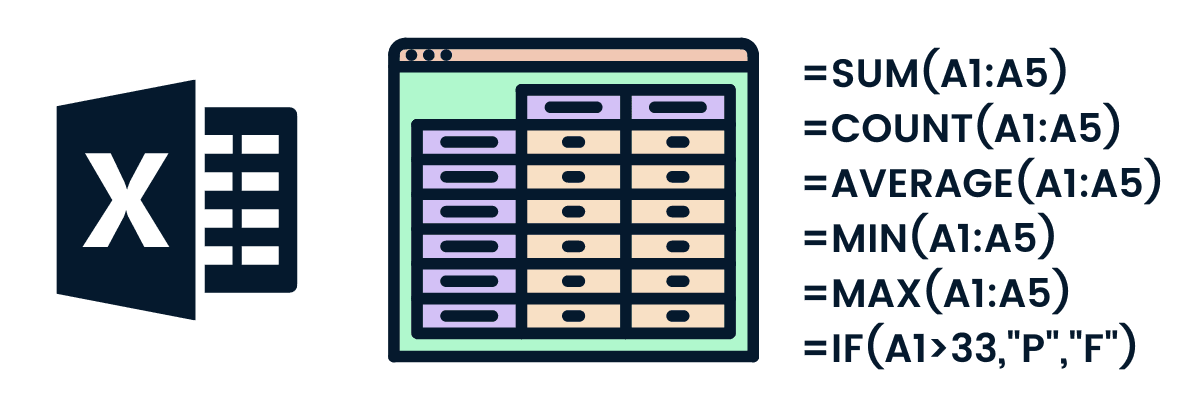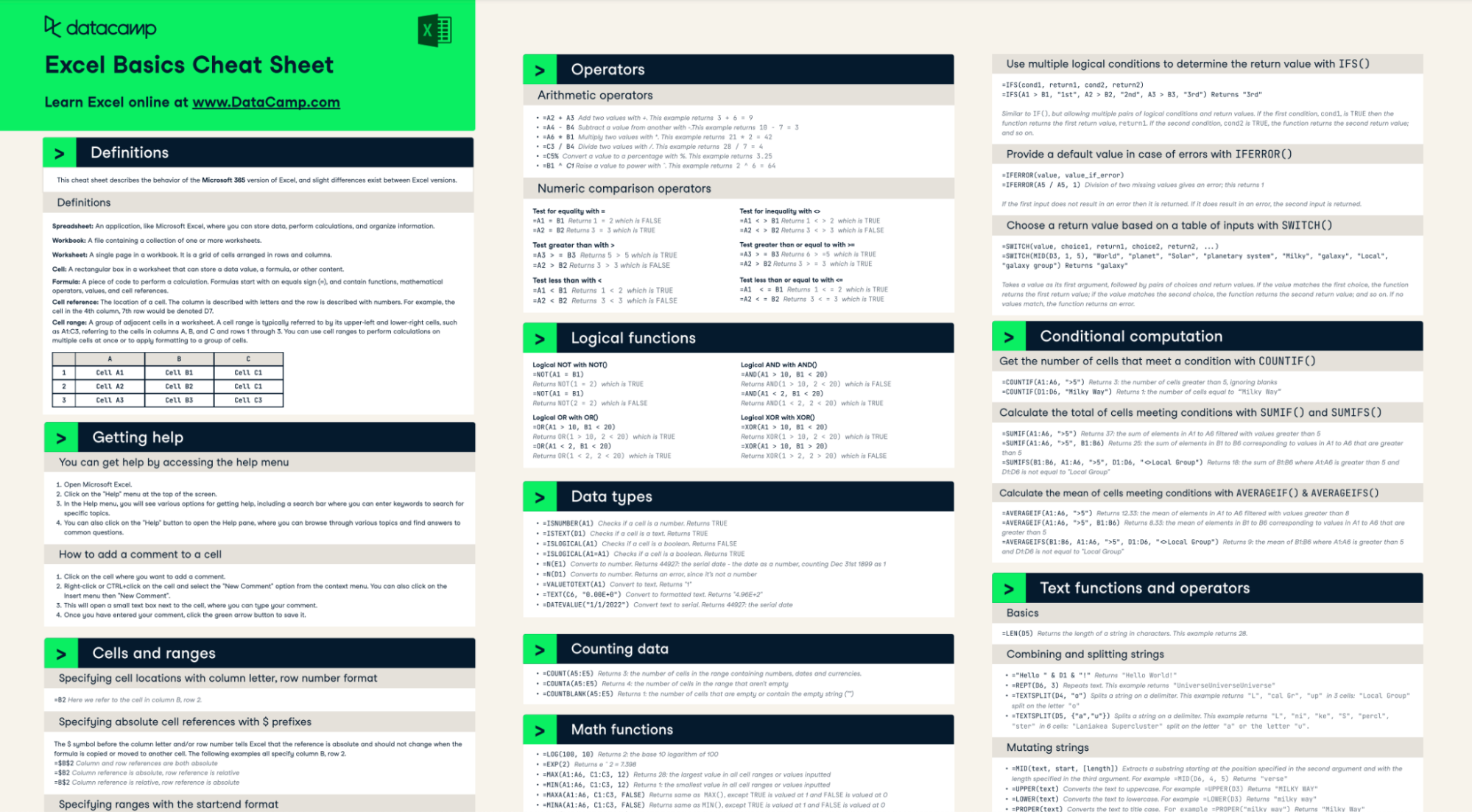Para profissionais de todos os níveis, desde iniciantes até usuários avançados, dominar o Excel e as planilhas pode ser útil para o desenvolvimento da carreira. Neste guia, vamos ver como conseguir uma Certificação do Microsoft Excel — uma credencial reconhecida que mostra que você é craque no Excel e melhora suas habilidades de análise de dados.
Essa certificação é mais do que aprender a usar um software; é sobre entender melhor como mexer com dados e tomar decisões. Ao analisarmos o processo de obtenção dessa certificação, nosso objetivo é fornecer a você um guia claro e detalhado, tornando sua jornada para o domínio do Excel simples e gratificante. A qualquer momento, eu recomendo que você participe do nosso programa básico sobre planilhas para melhorar seus conhecimentos em Excel.
Avance em sua carreira com o Excel
Adquira as habilidades para maximizar o Excel - não é necessário ter experiência.
Por que fazer a certificação no Microsoft Excel?
Se você está lendo este artigo, é provável que esteja tentando decidir se vale a pena obter uma certificação em Excel. Além do compromisso de obter uma certificação, também é preciso pensar no custo, no tempo e nos benefícios que ela traz. Felizmente, tem várias vantagens em conseguir uma certificação do Excel:
Mostra que você sabe fazer isso
A certificação do Microsoft Excel não é só um diploma; é uma prova concreta de que você sabe usar bem uma das ferramentas mais importantes na análise de dados. Essa certificação mostra claramente para os empregadores que você sabe usar as funcionalidades mais complexas do Excel, o que te destaca no mercado de trabalho.
Aumenta a empregabilidade
Num mercado de trabalho cada vez mais competitivo, saber usar o Excel é muitas vezes um requisito básico. Ter uma certificação fica bem no seu currículo, mostrando seu compromisso com o desenvolvimento profissional e sua capacidade de lidar com funções centradas em dados de forma eficaz.
Aumenta as oportunidades de carreira
A ampla aplicação do Excel em setores como finanças, marketing e operações significa que a certificação abre portas para uma variedade de carreiras. Como profissional certificado em Excel, você pode explorar funções que exigem especificamente conhecimentos avançados do Excel, como analista de dados, especialista em inteligência empresarial ou analista financeiro.
Aumenta a produtividade e a eficiência
Com a certificação, você vai aprender tudo sobre os recursos avançados do Excel. Essa experiência permite que você simplifique os fluxos de trabalho, automatize cálculos e melhore a análise de dados, levando a um aumento da produtividade em sua função profissional.
Aumenta a confiança
Conseguir a certificação do Excel mostra que você sabe lidar com tarefas complexas usando o software. Essa garantia é super importante, principalmente quando você tá lidando com problemas complicados relacionados a dados, garantindo que você possa encarar tudo com confiança.
Ajuda a tomar decisões com base em dados
A certificação Excel te dá as habilidades necessárias para analisar dados de forma eficaz, criar visualizações perspicazes e gerar relatórios precisos. Ter boas habilidades de comunicação é realmente essencial, não importa em que empresa você trabalhe.

Algumas das fórmulas fundamentais do Excel que você vai precisar para obter a certificação
Quanto tempo leva pra conseguir a certificação no Excel?
De acordo com as páginas oficiais da Certificação Microsoft, você vai precisar de cerca de 150 horas de experiência prática e instrução, além de experiência relevante no setor. Você pode ganhar essa prática com o nosso programa de habilidades Excel Fundamentals.
Elegibilidade e requisitos para a certificação Excel
Buscar uma certificação do Microsoft Excel significa escolher o nível e a versão certos que combinam com suas habilidades e objetivos. A Microsoft oferece dois níveis principais de certificação no Excel: Excel Associate e Excel Expert. Cada um desses níveis está disponível para diferentes versões do Microsoft Office, incluindo 2016, 2019 e 365.
Microsoft Office Specialist: Excel Associado
Se você está procurando uma certificação de nível Excel Associate, saiba que o nome completo do exame é Microsoft Office Specialist: Excel Associate (Microsoft 365 Apps), também conhecido como exame MO-201. Para o teste, o ideal é que você tenha cerca de 150 horas de instrução e experiência prática com o Excel, além de proficiência comprovada em nível associado em uma função relevante.
- Visão geral: A certificação Excel Associate é voltada para pessoas que querem mostrar que sabem usar o Excel. Ele abrange recursos essenciais, como criar e gerenciar planilhas, aplicar fórmulas e criar gráficos.
- Versões disponíveis: Essa certificação é oferecida para o Microsoft Office 2016, 2019 e Microsoft 365 Apps. Cada versão foca nas funcionalidades e ferramentas específicas disponíveis nessa versão do Excel. A versão de 2013 já não está mais disponível.
- Habilidades avaliadas: Gerenciar planilhas e pastas de trabalho, fazer operações com fórmulas e funções, criar gráficos e tabelas, etc.
- Duração do exame: O exame dura 50 minutos e tem 25 perguntas.
- Custo: US$ 100
Microsoft Office Specialist: Especialista em Excel
Se você quer fazer uma certificação de nível avançado no Excel, é bom dar uma olhada no nome do exame: Especialista em Microsoft Office: Especialista em Excel (Microsoft 365 Apps), também conhecido como exame MO-211. A Microsoft recomenda que você tenha 150 horas de experiência como especialista no setor.
- Visão geral: A certificação Excel Expert é feita pra quem já sabe usar o Excel e quer mostrar que é craque nisso. Essa certificação envolve tarefas complexas, como gerenciar fórmulas avançadas, macros e análise de dados.
- Versões disponíveis: Assim como o nível Associado, a certificação Especialista está disponível para o Microsoft Office 2016, 2019 e 365 Apps, com cada uma focando nos recursos avançados específicos dessa versão. A versão de 2013 já não está mais disponível.
- Habilidades avaliadas: Gerenciamento avançado de dados, criação de fórmulas e macros complexas, gerenciamento de gráficos e tabelas avançados, etc.
- Duração do exame: O exame dura 50 minutos e tem 35 perguntas.
- Custo: US$ 100
Entendendo os exames de certificação do Microsoft Excel
Vamos dar uma olhada nos exames de certificação mais recentes da Microsoft, o MO-210 (Associado) e o MO-211 (Especialista) para o Microsoft 365, conforme descrito na Certiport.
Exame Excel Associate (Microsoft 365 Apps) MO-210
Esse exame avalia as habilidades básicas do candidato no Excel e sua capacidade de aplicar essas habilidades em situações práticas.
Foco no exame
- Áreas principais: Criar e gerenciar planilhas e pastas de trabalho, usar células e intervalos, tabelas, fórmulas e funções, além de criar gráficos e objetos.
- Aplicações no mundo real: Os participantes do teste precisam mostrar que sabem criar várias pastas de trabalho, como orçamentos e demonstrações financeiras, e usar elementos gráficos para representar os dados.
Estrutura do exame
- Áreas objetivas: O exame abrange várias áreas importantes, incluindo gerenciamento de planilhas e pastas de trabalho, manipulação de dados, gerenciamento de tabelas, operações com fórmulas e funções e gerenciamento de gráficos.
- Abordagem baseada no desempenho: Os candidatos são avaliados por meio de tarefas práticas em um ambiente simulado, com foco na compreensão da finalidade e do uso das funcionalidades do Excel.
Dicas de preparação
- Use os recursos de aprendizagem: Os guias de estudo e os exames práticos da Microsoft são essenciais para uma preparação completa.
- Ganhe experiência prática: Não tem nada melhor do que praticar com o Excel. Dá uma olhada no nosso post 20 projetos de análise de dados para todos os níveis para ter algumas ideias.
Exame Excel Expert (Microsoft 365 Apps) MO-211
Esse exame foi feito pra avaliar as habilidades avançadas de alguém no Excel, com foco em criar, gerenciar e distribuir planilhas complexas pra vários fins específicos.
Foco no exame
- Áreas principais: O exame testa a capacidade de personalizar ambientes do Excel para necessidades específicas do projeto, aumentando assim a produtividade. As principais áreas incluem gerenciar opções e configurações da pasta de trabalho, gerenciar e formatar dados, criar fórmulas e macros avançadas e gerenciar gráficos e tabelas avançados.
- Aplicativos de nível avançado: Os candidatos devem mostrar que sabem criar exemplos sofisticados de pastas de trabalho, como modelos de negócios personalizados, gráficos financeiros, tabelas de amortização e cronogramas de inventário.
Estrutura do exame
- Áreas objetivas: O exame abrange uma série de tópicos avançados, incluindo:
- Gerenciando as configurações da pasta de trabalho e os recursos de colaboração.
- Manipulação e formatação avançadas de dados.
- Criar e resolver problemas em fórmulas e macros complexas.
- Desenvolver e gerenciar gráficos e tabelas dinâmicas sofisticadas.
- Abordagem baseada no desempenho: O formato do exame envolve a realização de tarefas práticas em um ambiente simulado, com ênfase na compreensão da finalidade e do uso comum das funcionalidades avançadas do Excel.
Dicas de preparação
- Recursos de estudo: Use os guias de estudo oficiais da Microsoft e pratique com projetos avançados do Excel.
- Experiência prática: Ter uma experiência prática e profunda com os recursos avançados do Excel é essencial para passar no exame.
Guia passo a passo para conseguir sua certificação em Excel
Conseguir uma certificação do Microsoft Excel exige dedicação, preparação e entender bem o processo. Aqui está um guia passo a passo para ajudá-lo a trilhar esse caminho com sucesso.
1. Escolha a certificação certa
Comece por determinar o seu nível - se você está mais apto para a certificação Excel Associate ou Excel Expert. Essa decisão deve ser baseada na sua experiência atual e nos seus objetivos de carreira. Além disso, pense em qual versão do Microsoft Office (2016, 2019 ou 365 Apps) você conhece melhor, porque cada versão tem seu próprio exame de certificação específico.
2. Entenda os requisitos do exame
É importante se familiarizar com os detalhes do exame de certificação que você escolheu. Isso inclui entender as habilidades que serão avaliadas e o formato do exame. Os sites oficiais de certificação da Microsoft têm um monte de detalhes sobre os objetivos e pré-requisitos dos exames.
3. Prepare-se para o exame
A sua preparação deve incluir o estudo dos guias oficiais da Microsoft e outros materiais de treinamento relevantes para o exame escolhido e a versão do Excel. Além do estudo teórico, é essencial ter experiência prática com o Excel. Essa prática prática garante que você se sinta confortável e seja craque em todos os aspectos do aplicativo. Você pode colocar a mão na massa com nosso curso Análise de Dados no Excel.
4. Pratique com o Excel
Fazer provas simuladas é uma etapa importante na sua preparação. Esses exames dão uma ideia da estrutura do exame e dos tipos de perguntas. Aproveite essas oportunidades de prática para identificar e focar nas áreas em que você precisa estudar ou praticar mais para melhorar sua proficiência.
5. Marque o exame
Quando você se sentir pronto, marque seu exame de certificação em um centro de testes autorizado ou por uma plataforma online. Quando for escolher a data do seu exame, veja se ela combina com o seu nível de preparação e se encaixa na sua agenda.
6. Faça o exame
No dia da prova, encare-a com confiança, lembrando que ela foi criada para avaliar conhecimentos práticos parecidos com as tarefas que você praticou. Fique calmo e concentrado, usando o que você estudou e praticou pra passar no exame.
7. Manter e renovar a certificação
Lembre-se de que o mundo do Excel está sempre mudando, e algumas certificações podem precisar ser renovadas de vez em quando. Manter-se atualizado com esses requisitos é importante para manter sua certificação válida e suas habilidades relevantes. Não deixe nada passar!
Preparando-se para a certificação do Excel com o DataCamp
Temos vários cursos e recursos que podem te ajudar a dominar o Excel e se preparar para uma certificação. Aqui estão algumas ideias para você começar.
Para quem tá começando
- Comece com a Introdução ao Excelou dê uma olhada em todos os nossos cursos de Excel. São um excelente ponto de partida para quem está começando a usar planilhas profissionais.
- O programa de habilidades Fundamentos de planilhas se baseia nas suas habilidades básicas, preparando você para tarefas mais complexas e tomadas de decisão comerciais perspicazes.
- Aprenda a analisar dados com tabelas dinâmicas e funções lógicas intermediárias antes de passar para ferramentas como análise hipotética e previsão com nosso curso Análise no Excel.
- Nossa Folha de Referência de Fórmulas do Excel é uma referência útil para algumas das fórmulas essenciais que você vai precisar.
- Com nosso tutorial sobre as fórmulas essenciais do Excel, você vai aprender a usar o Excel.

Nossa folha de dicas básicas do Excel pode te ajudar a conseguir a certificação.
Para usuários avançados
- Melhore suas habilidades de análise de dados com funções avançadas como VLOOKUP no curso Análise de dados em planilhas.
- Domine a arte de analisar e comparar dados usando tabelas dinâmicas com o curso Tabelas dinâmicas em planilhas.
- Se você quer se aprofundar na análise do Excel, nossa Introdução à Estatística em Planilhas foca em médias, distribuições, testes de hipóteses e muito mais.
- Descubra como mexer nos dados no Excel com a nossa Folha de Referência para Manipulação de Dados no Excel.
Considerações finais
Melhorar suas habilidades no Excel e conseguir a certificação não é só passar num exame; é dominar uma ferramenta e melhorar suas capacidades profissionais. Se você está começando do zero ou aprimorando suas habilidades avançadas, o caminho para dominar o Excel é gratificante, abrindo portas para novas oportunidades e insights.
Pronto para dar o primeiro passo? Comece com o programa “Fundamentos de planilhas” do DataCamp, feito pra te ajudar a dominar o Excel. Com dedicação e os recursos certos, sua certificação está ao seu alcance, e as habilidades que você adquirir serão úteis por muitos anos.
Obtenha a certificação para a função de dados dos seus sonhos
Nossos programas de certificação ajudam você a se destacar e a provar que suas habilidades estão prontas para o trabalho para possíveis empregadores.

Perguntas frequentes
Tem algum pré-requisito pra se inscrever num programa de Certificação do Microsoft Excel?
Embora não haja pré-requisitos formais para se inscrever em um programa de Certificação Microsoft Excel, é recomendável que os candidatos tenham cerca de 150 horas de experiência prática e instrução no Excel, além de alguma experiência relevante no setor, para garantir que estejam prontos para os exames de certificação.
A certificação do Microsoft Excel pode ajudar em áreas além de finanças e análise de dados?
Sim, a Certificação Microsoft Excel é útil em várias áreas além de finanças e análise de dados, incluindo marketing, gerenciamento de projetos, educação e saúde, onde as capacidades de organização, análise e visualização de dados do Excel podem ser usadas para melhorar a eficiência e a tomada de decisões.
Como escolher entre os níveis de certificação Excel Associate e Excel Expert?
Escolha entre os níveis de certificação Excel Associate e Excel Expert com base na sua proficiência atual, objetivos de carreira e as funcionalidades específicas do Excel que você quer dominar. O nível Associado é ideal para quem está começando, enquanto o nível Especialista é para quem já sabe bastante do Excel e quer mostrar que é craque.
Tem alguma diferença no formato do exame entre os níveis Associado e Especialista?
Embora os níveis Associado e Especialista avaliem suas habilidades práticas no Excel, o exame do nível Especialista exige um entendimento mais profundo e proficiência no gerenciamento de recursos avançados, como fórmulas complexas, macros e ferramentas de análise de dados. Os dois exames usam uma abordagem baseada no desempenho para avaliar a capacidade dos candidatos de usar as funcionalidades do Excel em situações reais.
Posso refazer o exame de certificação do Excel se não passar na primeira tentativa?
Sim, se você não passar no exame de certificação do Excel na primeira tentativa, pode refazer o exame 24 horas depois. Entre todas as tentativas seguintes (até cinco), tem um período de espera de 14 dias. Dá uma olhada na política de repetição da Microsoft pra saber mais detalhes.
Que outras certificações estão disponíveis?
Tem várias certificações que cobrem diferentes tecnologias e carreiras. Dá uma olhada em alguns dos nossos outros guias pra ter uma visão geral:
